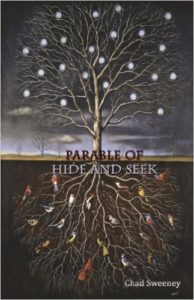Parable of Hide and Seek
 by Chad Sweeney,
by Chad Sweeney,
Alice James Books, 2010,
88 pages, paper, $15.95,
ISBN: 978-1-882295-82-1
Buy the Book
If you’ve ever had the good fortune to attend a Chad Sweeney reading, then you already know that these events are rapid-fire rehearsals of the word. It’s a different experience, however, when these poems are found on the page, and we are lucky to have a new collection from Sweeney. Parable of Hide and Seek could be described as an inheritor to some of his earlier work in that it builds large, imagistic worlds out of a very keen sense of perception and metaphor. In Parable of Hide and Seek, Sweeney has pared down the language until each poem becomes something of a koan, or a short Gnostic parable.
What I have always admired and appreciated about Sweeney’s poems is their great sense of empathy and emotional maturity. They are never sentimental, but it is clear from the first word to the last that this is someone who pays close attention to the world, to the names and sounds of things, as any good poet should. An example from “The Piano Teacher”:
A music box wound too tightly will explode,
playing its song all at once.
The practice is to unwind the song slowly.
Think of this when you touch the key of C.
In “The Sentence,” Sweeney is at his absurd and imagistic best, insisting:
The bones of Marcel Duchamp
laid end to end
reach all the way
to the bottom of this hill
where a little slab of concrete bridges one
obscurity to another
We go on to discover that the speaker places Duchamp’s jaw in just such a way that “the oblique syntax of bones / repeats its inquiry / in the language of the world.”
This could very easily be written off as an odd ars poetica, but there is more wishing to be expressed underneath this poem. The specificity of naming Marcel Duchamp, for example — the notion that the artist’s bones can be found and re-purposed — gives the sense that all modes of expression are languages that bring us into relationships, and that each strange relationship is a way of speaking to one another on a level of deep engagement.
If absurdity marks the beginning of meaning in these poems, Sweeney’s objective is far from simply causing bewilderment. As he says in the title poem:
I hid as a bullet fired into hay.
I hid as a system of government.
You were my partner in everything.
I lived for you to find me.
This is the genius of Chad Sweeney’s poetry. These poems only mystify so far as to draw you into them, so that the poems become a communion between speaker and reader.
I have personally walked away from a session of reading these poems (and I can’t help coming back to them over and over again) feeling as if I have just witnessed some marvelously catastrophic event. There is terror and pathos in these poems, bullets and governments, but there is also partnership, friendship, and love. In other words, for every complication presented, Sweeney may not give an answer, but hints thoughtfully at a new direction.
— Thom Dawkins

